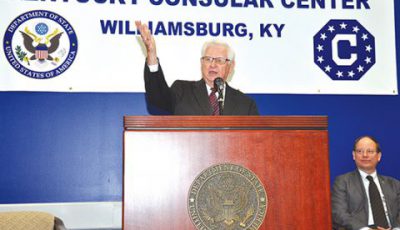KCC union begins new round of negotiations with current contract set to expire
 As standoffs between workers and corporations have loomed heavily in headlines recently with the strikes of several high-profile labor unions sparked by the differences in demands, a local union in Whitley County is currently in contract negotiations of their own.
As standoffs between workers and corporations have loomed heavily in headlines recently with the strikes of several high-profile labor unions sparked by the differences in demands, a local union in Whitley County is currently in contract negotiations of their own.
The Kentucky Consular Center (KCC) sits just off Exit 15 in Williamsburg, where it has operated in its current capacity as a federal facility for over two decades. The work done at KCC plays a pivotal role in the decision-making of consular officers in various embassies and consulates all over the world when determining whether or not to approve a visa.
Specifically, KCC manages information regarding non-immigrant visas—or visas for foreign nationals entering the United States only on a temporary basis for reasons such as work or tourism. If someone has travelled to the US by way of a non-immigrant visa, the request was most likely vetted at KCC at some point.
The actual KCC facility is owned and maintained by the federal government, though the day-to-day operations are overseen by a company that is awarded a multi-year contract to handle visa services for the Department of State. The contract is awarded through a competitive bidding process. Currently, the company who holds that contract is LDRM, a joint venture based out of Herndon, Virginia. They assumed their role as the contractor in March 2020.
Traditionally, the visa contract isn’t awarded to the same company in back-to-back bids, meaning that the contractor often changes every few years. When a new company comes in to manage the facility, they often bring their own set of corporate standards that could differ from the previous contractor, including wage scales.
For most of LDRM’s time as the contractor, much of the KCC workforce has been part of the United Electrical, Radio and Machine Workers (UE) of America union.
In June 2020, following several months of organizing, workers voted in overwhelming numbers to unionize under the UE banner, creating UE Local 728. Elections were soon held and officers were seated. Negotiations for Local 728’s first-ever bargained contract began in September 2020, which was drawn out until after the Thanksgiving holiday after discussions stagnated over several key issues, chief among them pertaining to compensation.
A deal was eventually struck after members of Local 728 staged a one-day work stoppage strike, with a contract officially being ratified at the beginning of December 2020.
That contract, however, is set to expire at the end of October.
With the impending end of their initial contract, a negotiating committee has been formed to once again bargain with LDRM regarding terms of a new contract. Those negotiations began Monday, with Local 728 renting space at the Corbin Center to allow for face-to-face discussion with the company. In-person negotiations are currently only scheduled to take place through Friday.
Kevin White, president of Local 728, told the News Journal Monday that he was confident in getting a favorable outcome for the employees at KCC. White noted that he, along with the rest of the negotiating committee—comprised of Local 728 officers and members, as well as a couple UE international representatives—were “motivated” to get a deal done as quickly and fairly as possible.
“We told the company with our opening statement that we hope for productive bargaining that is able to deliver an agreement that both sides are happy with and can live with by the end of the week. That’s the goal,” said White.
“The difference between 2020 and today is that, back then, not only did the company not really understand labor relations and the power of a union, neither did our members. Now that relationship has had time to mature, so not only are our members confident in their powers in upholding and standing up for their own rights as workers, the company has had three years of dealing with us and there’s that recognition and respect.”
Non-economic proposals are typically the smoothest part of the negotiating process as both sides can often find common ground more easily. Once negotiations begin regarding economic proposals is when most disagreements arise. As of the end of negotiations on Tuesday, White confirmed that economic proposals had yet to be discussed. He said he doesn’t expect those to begin until late Wednesday or sometime Thursday.
Despite his and the negotiating committee’s optimism in being able to work effectively with LDRM during bargaining, White said that they have been trying to temper expectations of workers within the facility, as he doesn’t anticipate a deal will be in place by the end of the week.
The reasoning for that assumption is based on the committee’s top priority for their next contract, and White did not parse words when asked what that was.
 “Wage increases. That’s always number one. A living wage that keeps up with the times. We bargained our last contract in 2020. The world has changed a lot since then. So, we just want our wages to keep up with the cost of living,” said White. “We’re fighting for our rights and our respect on the job…and we want our wages to reflect that.”
“Wage increases. That’s always number one. A living wage that keeps up with the times. We bargained our last contract in 2020. The world has changed a lot since then. So, we just want our wages to keep up with the cost of living,” said White. “We’re fighting for our rights and our respect on the job…and we want our wages to reflect that.”
Several dozen members of Local 728 were in attendance for the start of contract negotiations Monday morning in a display of solidarity with the negotiating committee, and more members filed in and out as the day went on.
Caroline Gambrel, one of the many members present Monday, echoed similar sentiments to that of the committee regarding her primary concern.
“As a federal contractor, the work we do at KCC is praised and recognized around the world. We demand LDRM give us a livable wage increase that we deserve,” said Gambrel.
Another member on-hand Monday, Tiffany Wittenback, told the News Journal that she was ready to see real, meaningful change come from the new contract.
“Every single person deserves fair employment standards and competitive pay rates. The world is changing quickly; we all have the right to try to secure our futures, pursue our dreams and raise our families. Our employers would have us sacrifice those rights to secure their own profits,” said Wittenback. “I have worked at this facility for over seven years, and while I’m proud of what I’ve accomplished, I am no longer interested in the empty promises and hollow praises.”
Meanwhile, member Jacob Carpenter talked about how vital it is for the two entities to be able to come to a compromise for the benefit of all involved.
“It’s very important that both the union and LDRM come together and negotiate a fair contract as that is vital to establishing working condition that will help increase retention rates while also improving the quality of life for every employee. When that happens, everyone comes out better than before,” said Carpenter.
According to White, the committee hopes to see a deal put in place through 2024 and into sometime in 2025, as LDRM’s contract with the federal government ends in November 2024. Being able to secure extra time will help ensure they don’t have to bargain with LDRM again if the company does not retain the visa contract beyond its expiration.
If the two sides cannot reach an agreement by week’s end, the rest of negotiations are expected to take place via Zoom, though White said he was not sure when those would be scheduled.
As part of their current contract with LDRM, workers at KCC are beholden to a no strike/no lockout clause. But, if negotiations break down and a deal is not reached before the current contract expires, members could consider taking steps to slow or stop work entirely beginning November 1.








